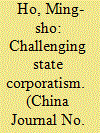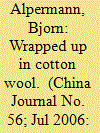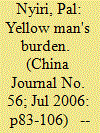|
|
|
Sort Order |
|
|
|
Items / Page
|
|
|
|
|
|
|
| Srl | Item |
| 1 |
ID:
073382


|
|
|
|
|
| Publication |
2006.
|
| Summary/Abstract |
This paper traces the post-authoritarian development of state-labor relations in Taiwan by focusing on the union federation movement (1994-2004). Since the late 1980s, Taiwan's labor movement has sought to challenge state-corporatist control, in the sense of representative monopoly by a conservative national federation. Owing to legal restrictions and the availability of support from the Opposition, Taiwan's labor movement opted for the strategy of political alignment rather than building organizational basis. Close cooperation with Opposition élites enabled the labor movement to bend the iron bars of state corporatism with a relatively weak organizational basis. With the legalization of the Taiwan Confederation of Trade Unions in 2000, industrial labor finally acquired an institutional position within the political system and was able to promote labor reforms. Nevertheless, the TCTU remained organizationally fragile, financially weak and faction-ridden as a result of the political alignment strategy. Consequently, the demise of state corporatism ended the labor federation movement, rather than ushering in a new era of societal corporatism.
|
|
|
|
|
|
|
|
|
|
|
|
|
|
|
|
| 2 |
ID:
073383


|
|
|
|
|
| Publication |
2006.
|
| Summary/Abstract |
In contemporary China, conditions for doing fieldwork are increasingly dependent on locality. Access to the Xinjiang Uyghur Autonomous Region has come under repeated threat as a series of domestic and international events (the pro-democracy campaign and Tian'anmen incident of 1989, the collapse of Marxist-Leninist parties in Eastern Europe in 1989, the Baren uprising of April 1990 in south Xinjiang, the formation of independent Central Asian states in 1991, the Ghulja riots of February 1997, and the events of 11 September 2001) in turn affected local conditions. Researchers and journalists have subsequently come under intense state scrutiny. Yet state politics are only one facet of the difficulties faced in Chinese Central Asia; this article also explores the personal "politics" of gender, culture, religion and values as these affect the negotiation of research roles. It is about operating within shifting margins: the margins of the state, gender margins, inter-cultural and religious margins. The discussion, drawing on a total of fifteen months' research conducted between 1995 and 2004, may prepare first-time ethnographers for the field experience in Xinjiang, while also allowing seasoned researchers to share methodologies, and may be relevant to other sensitive research settings as well.
|
|
|
|
|
|
|
|
|
|
|
|
|
|
|
|
| 3 |
ID:
073380


|
|
|
|
|
| Publication |
2006.
|
| Summary/Abstract |
The growing prominence of private entrepreneurs in China's economy poses a possible challenge to the supremacy of the Chinese Communist Party and its grip on political power. This paper examines the Party-state's counter-strategy of integrating entrepreneurs into the existing political system, using the newly liberalized cotton sector as an example. It is argued that entrepreneurs' integration into officially sanctioned organizations indeed has the intended effect of aligning their political thinking more closely with official discourses. However, the orientation of the local state toward the private economy also has considerable impact on political attitudes of private entrepreneurs. Thus, the success of the Party-state's strategy appears to be highly contingent on local patterns of state-society interaction.
|
|
|
|
|
|
|
|
|
|
|
|
|
|
|
|
| 4 |
ID:
073381


|
|
|
|
|
| Publication |
2006.
|
| Summary/Abstract |
Focusing on the development emphasis in discussions of Chinese migration abroad, this article interrogates the connection between the Chinese discourse of overseas development and the domestic stress on "constructing civilization" and improving the "quality" of the population. Like some Western states earlier in history, China is becoming a source of foreign investment and a participant in international development discourse (though not in its current institutions) while intensely engaged in a modernizing process at home that it feels is still far from completion. Chinese migrants abroad are central to both the process and the discourse. How, then, does the new role in overseas development fit into Chinese discourses of domestic modernization? More particularly, how do encounters with overseas subjects of development affect the position of development's putative Chinese harbingers? I argue that the view of China as having taken over the torch of the global modernizing mission unites otherwise disparate groups (government officials, migrant entrepreneurs and Christians) and is central to understanding the Chinese view of the country's position in the world.
|
|
|
|
|
|
|
|
|
|
|
|
|
|
|
|
|
|
|
|
|